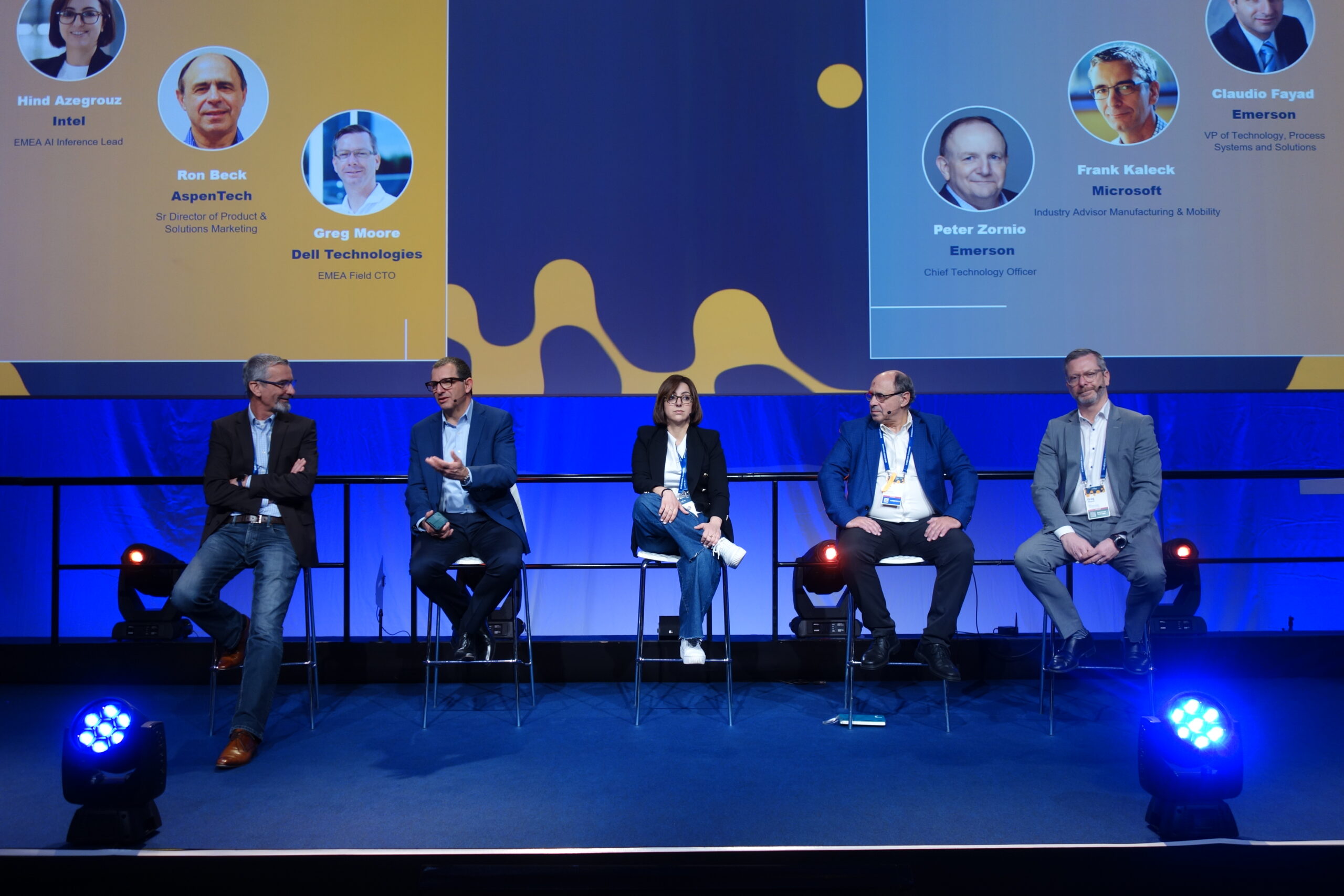
Panelists (left to right) Frank Kaleck, Claudio Fayad, Hind Azegroud, Ron Beck, Greg Moore
On the third day of the Emerson Exchange EMEA 2024, Peter Zornio, Chief Technology Officer at Emerson led an hour-long panel discussion on the benefits of AI for the industry. Under the heading “Forging Tomorrow – Unleashing the Industrial AI Benefits”, a distinguished panel outlined their initial opinions about artificial intelligence (AI) and their current thoughts. Participants included Frank Kaleck, Industry Advisor Manufacturing & Mobility at Microsoft, Claudio Fayad, Vice president of Technology for Emerson’s Process Systems and Solutions, Hind Azegroud, Intel’s AI interference Lead EMEA, Ron Beck Senior Director of Product & Solution Marketing at AspenTech, and Greg Moore EMEA Field CTO of Dell Technologies.
Rather than try to summarize the discussion, here is collection of interesting quotes, which although not exhaustive, can certainly provide food for thought and useful information related to AI and its application in industry. Although the statements are not controversial, we’ve left the individual quotes unattributed.
- Software and hardware integration is at the core of integration, we must show our customers the best combination to tackle the type of problems they have in their operations.
- What some people forget is that AI goes back a comparatively long way within industry, with fuzzy logic for control systems available back in the 1990s.
- It’s not just the AI model you use that is important. It’s how you collect the data, aggregate the data from different assets and bring it into an AI model. Data quality is important.
- Traditional numerical and AI fuzzy logic, neuronal nets and pattern recognition go back 30 years in industrial automation. Now, with large language models and generative AI, new opportunities come into play, but it is not an `either or’ decision, both will be needed in the future.
- The difference between old AI and new AI: If you think of traditional AI, it is like talking to a nerd in IT, a guy who really understands analytics and machine learning, but you wouldn’t be able to articulate what your problem is to him and the help you want. With generative AI, it is as if you have an intern. One who speaks 50 languages and knows everything the internet knows. That is the help you want.
- Generative AI is a powerful tool to help organizations. But of course, people – the employees – are still needed, because someone must orchestrate the “interns”, and has to double check the feasibility of the results.
- Prescriptive maintenance solutions using intelligent agents to look for problems with equipment and assets are untapped so far. Why? Because organizations are resisting. But the good news is, IT and OT are starting a conversation and are coming together to use AI. And if there is a real exchange of expertise between maintenance experts and data scientists, the potential is huge.
- The horsepower needed for AI is getting smaller, so it can be deployed at the edge, and not just in the cloud. Some assets are very remote, such as an oil field or in a remote part of a factory. So, the technology has to operate under adverse conditions and have high levels of resilience and cyber security, because reaction times to potential physical intrusions can be longer. But it is a big area of interest and the technology to solve the problems is there.
- There is a lot of debate about the AI’s training base on which it creates results, answers questions or writes code. Is it using someone’s copyrighted material or presents you with licensed code? Am I violating somebody’s license by using written code? This shows that data governance is important and clear regulations are needed as orientation for companies to be safe against lawsuits and to protect their intellectual properties and rights.
- When you put together data from different sources, especially if modules or plants should become autonomous, it is imperative for correct results and decisions to assign data with quality scores. Is the data coming from a new, internal system or an external or old one? That can make the difference here.
- With the introduction of AI technologies, the fear of losing jobs is a factor. Same as it was for example with the introduction of IT mainframes. But how many jobs are in IT? We think there’s the same potential for generative AI. But there is a lot of retraining that has to be done. Lifelong learning and adoption are really needed.
- Culture and strategy are crucial, especially for small and medium sized companies. Because the success lies not in the pilot project, but in scaling up.
- Decarbonization is one of the biggest opportunities for AI, because of the complexity of the whole system. The world doesn’t have many operating electrolyzers yet for green hydrogen. So, what must happen is the data must be pooled across, multiple companies to learn faster. But how do you get the companies to agree? By securing and “blackbox” data feeds and make reverse engineering impossible. In that way, data can be provided to holistic models and digital twins – and everybody benefits.
- The autonomous plant is not coming soon, but we are on the way to it. Before we reach the possibility of it there will be a lot of “co-piloting” for humans through AI that can solve the problems of missing experts in industry.



